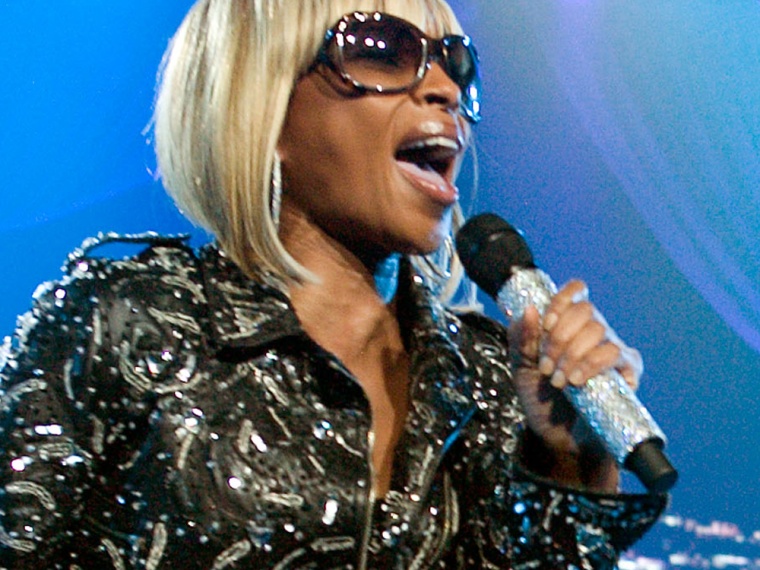In the music industry, the widely accepted maxim seems to be that female pop singers who dress provocatively, dance seductively and sing suggestively sell the most records.
But “Queen of Hip-Hop Soul” Mary J. Blige rarely goes there. While Kelis sings about her “milkshake” bringing “the boys to yard,” Mary J. tells young women everywhere “it’s OK showing yourself some love.”
Blige’s tortured life story is no secret to her fans. She grew up in Yonkers, N.Y., raised by a single mother who struggled with alcohol and drugs. Later, Blige also battled substance abuse and found herself in abusive relationships.
But she’s come a long way from recording Anita Baker songs in a mall 20 years ago. Last year her album “The Breakthrough” took the Grammys by storm. She’s topping the charts with her latest album, “Growing Pains,” all while refusing to fall into the “Bootylicious” trap that captures many female artists.
Fans had a rare opportunity to see the “Queen of Hip-Hop Soul” for free when she performed live on the TODAY Show plaza on Friday, May 9th.
Preacher, feminist, artist There is nothing like seeing Mary J. Blige sing live. At a recent show at Madison Square Garden — a stop on her “Heart of the City” concert tour with Jay-Z — Blige was part preacher, part feminist and all artist. The sheer physicality of her performance is stunning. She crouches, jumps, dances and struts. She doesn’t just sing the lyrics, they pour out of her. Most of the time, she wears sunglasses beneath her bright blond bob. She takes them off to signal that she’s about to get serious. As she becomes more emotional, the crowd — especially African-American females — responds in kind. They mouth every word. Blige practically handed over “I’m Going Down” to the audience — holding out the microphone and laughing while they sang every word and trill.
She talked directly to the female audience members, but told the guys to pay attention because “this concerns them.”
“How many ladies here tonight feel like your man doesn’t have enough money to measure up to what you’re worth?” she asked the audience, who screamed in response. “You should never feel like a gold digger!”
Part of a different stratosphere Filmmaker Byron Hurt has been a sharp critic of mainstream hip-hop, claiming it oversexualizes black women and pigeonholes black men into a violent type of masculinity. His film “Beyond Beats and Rhymes” takes aim at the music he grew up with, but the “Queen of Hip-Hop Soul,” he said, has entered into a different stratosphere.
“There’s an association of hip-hop culture and booty-shaking women — for better or worse, those two things are intertwined,” he said. “So a woman like Mary J. Blige, who is considered to be the ‘Queen of Hip-Hop Soul,’ she does not personify that same highly sexualized black woman. She’s a sexy black woman but she has not been sexualized.”
Blige is an antithesis to the scantily clad woman who gyrate on MTV and BET. She’s beautiful and in great shape, but no one would ever run a credit card down her behind as was done in Nelly’s “Tip Drill” video. Today, at 37, she sings about female empowerment — loving yourself before you can love someone else.
Hurt, who is set to release a new film about black masculinity, “Barack and Curtis,” which compares Sen. Obama to rapper 50 Cent, recalled seeing Mary J. Blige perform at the Superdome after Hurricane Katrina and was almost moved to tears.
“I turned around to all the women of color who were so connecting to Mary J. Blige and her music. They were singing every single lyric verbatim,” he said. “I think she has a special kind of effect on young women.”
Rebirth She makes no secret of her promiscuous and alcoholic past. Things changed for her in 2001 — a watershed year. Fellow R&B singer Aaliyah was killed in a plane crash. Just a few weeks later, the tragedy of Sept. 11 rocked her.
“Everything was just going crazy,” she told Oprah two years ago. “I was like, ‘You know what? This is a signal for me to wake up.’ ”
In 2002, she released the Grammy-nominated album “No More Drama.” The songs, including the title track, no longer dwell on being hurt, but on overcoming the pain. They are songs about rebirth. She continued in that vein with her Grammy-winning tribute to her husband, producer Kendu Isaacs, "Be Without You."

Now it seems with her latest album, “Growing Pains,” Mary J. Blige is on a mission to help women avoid the pitfalls and insecurities that plagued her.
“There’s so many-a girls I hear you been running/From the beautiful queen that you could be becoming," she sings in “Work That.” “You can look at my palm and see the storm coming/ Read the book of my life and see I've overcome it.”
Although she is approaching an Oprah-esque level, Hurt says she’s the kind of figure to whom other black woman can relate. Blige doesn’t take this responsibility lightly.
“I think she sees herself as a woman who has power and her music has power and she realizes her voice has power,” Hurt said. “And based on her work, I think she has made a conscious decision to make music and song, to make people dance and party, but also to bring out the best in people.”
Blige has found the best way to do that is to wear her heart on her sleeve. She’s honest with her fans, hoping that somehow they will learn from her mistakes and also learn they too can survive and, yes, even overcome. But even M.J.B. keeps some things to herself.
“Trust me, you don’t know everything about Mary J. Blige,” she said at her show on May 2. “You know a lot, but you don’t know everything.”